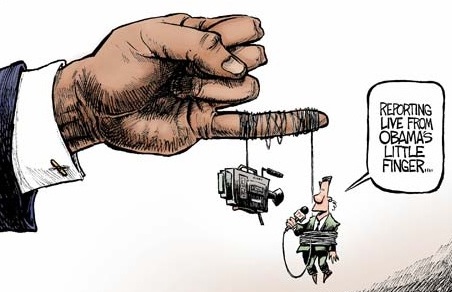Facebook faces what some are calling an “existential crisis” over revelations that its user data fell into the hands of the Trump campaign. Whether or not the attacks on the social media giant are justified, the fact is that the Obama campaign used Facebook (FB) data in the same way in 2012. But the reaction from the pundits and press back then was, shall we say, somewhat different.
According to various news accounts, a professor at Cambridge University built a Facebook app around 2014 that involved a personality quiz. About 270,000 users of the app agreed to share some of their Facebook information, as well as data from people on their friends list. As a result, tens of millions ended up part of this data-mining operation.
Consulting firm Cambridge Analytica, which paid for the research, later worked with the Trump campaign to help them target advertising campaigns on Facebook, using the data they’d gathered on users.
But while the Trump campaign used Cambridge Analytica during the primaries, it didn’t use the information during the general election campaign, relying instead on voter data provided by the Republican National Committee, according to CBS News. It reports that “the Trump campaign had tested the RNC data, and it proved to be vastly more accurate than Cambridge Analytica’s.”
Since this involves the Trump campaign, the news accounts have been suffused with dark conspiratorial tones. The Times article talks about how Trump consultants “exploited” Facebook data, and quotes a source calling it a “scam.” It has been widely described as a massive data breach.
But Facebook had been promoting itself to political parties looking for a new way to reach voters.
Nor was this the first time Facebook users had their data unwittingly shared with a political campaign.
In 2012, the Obama campaign encouraged supporters to download an Obama 2012 Facebook app that, when activated, let the campaign collect Facebook data both on users and their friends.
According to a July 2012 MIT Technology Review article, when you installed the app, “it said it would grab information about my friends: their birth dates, locations, and ‘likes.’ ”
The campaign boasted that more than a million people downloaded the app, which, given an average friend-list size of 190, means that as many as 190 million had at least some of their Facebook data vacuumed up by the Obama campaign — without their knowledge or consent.
If anything, Facebook made it easy for Obama to do so. A former campaign director, Carol Davidsen, tweeted that “Facebook was surprised we were able to suck out the whole social graph, but they didn’t stop us once they realized that was what we were doing.”
This Facebook treasure trove gave Obama an unprecedented ability to reach out to nonsupporters. More important, the campaign could deliver carefully targeted campaign messages disguised as messages from friends to millions of Facebook users.
The campaign readily admitted that this subtle deception was key to their Facebook strategy.
“People don’t trust campaigns. They don’t even trust media organizations,” Teddy Goff, the Obama campaign’s digital director, said at the time. “Who do they trust? Their friends.”
According to a Time magazine account just after Obama won re-election, “the team blitzed the supporters who had signed up for the app with requests to share specific online content with specific friends simply by clicking a button.”
The effort was called a “game-changer” in the 2012 election, and the Obama campaign boasted that it was “the most groundbreaking piece of technology developed for the campaign.”
The only difference, as far as we can discern, between the two campaigns’ use of Facebook, is that in the case of Obama the users themselves agreed to share their data with the Obama campaign, as well as that of their friends.
The users that downloaded the Cambridge app, meanwhile, were only told that the information would be used for academic purposes. Nor was the data to be used for anything other than academic purposes.
It’s an important distinction, to be sure, and Facebook is right to be attacked for its inability to control how its user data were being gathered and shopped around. (Facebook tightened its privacy rules on data sharing apps in 2015.)
But keep in mind that it wasn’t the Trump campaign that solicited the collection of the data. And, as we said, it didn’t use the data in the general election campaign.
Obama, in contrast, was collecting live data on active users right up until Election Day, and at a scale that dwarfed anything the Trump campaign could access.
More important, the vast majority of people involved in these data-mining operations had no idea they were participating. And in the case of Obama, they had no way of knowing that the Obama campaign material cluttering their feed wasn’t really just political urgings from their friends.
There is one other big difference: how these revelations were received by pundits and the press. In 2012, Obama was wildly celebrated in news stories for his mastery of Big Data, and his genius at mining it to get out the vote.
We were told then about how the campaign “won the race for voter data,” and how it “connected with young voters.” His data analytics gurus were treated as heroes.
This is not to say that Facebo0k doesn’t deserve criticism. Clearly, its data-protection policies have been slipshod.
But the recent fury exposes a massive double standard on the part of those now raising hell.
When Obama was exploiting Facebook users to help win re-election, it was an act of political genius. When Trump attempted something similar, with unclear results, it’s a travesty of democracy and further evidence that somehow he stole the election.
